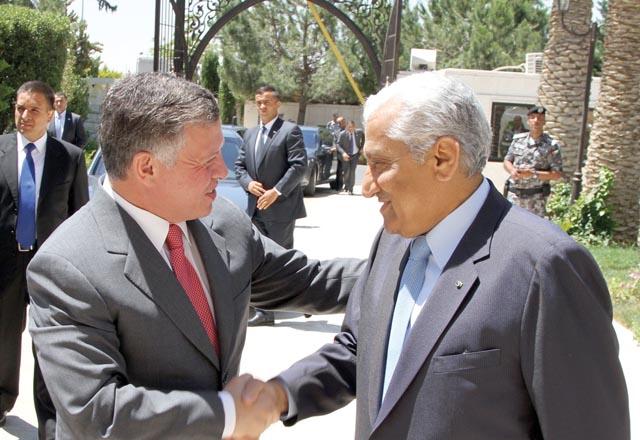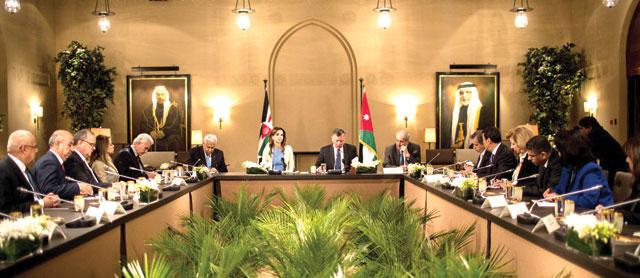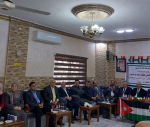You are here
Jordan ready to deal with regional developments, King tells Jordanians
By JT - Jun 18,2014 - Last updated at Jun 18,2014

AMMAN — His Majesty King Abdullah on Wednesday underlined Jordan’s complete readiness to deal with any regional developments that may pose a threat to the Kingdom’s security and stability.
Presiding over a Cabinet meeting on Wednesday, the Monarch said: “I want all Jordanians to rest assured that their country is strong enough and has taken all the precautions to defend its people, borders and territories.”
“We in Jordan are safe and in a very strong position. There is constant coordination and cooperation between the government and the army to defend Jordan’s borders and its internal security. We are keeping an eye on the regional developments and have nothing to fear.”
His Majesty also urged officials to shy away from handling citizens’ needs and complaints in offices, and instead go to the field in order to better see and understand their needs and problems, according to a Royal Court statement.
Addressing the Council of Ministers, the King said: “It is your responsibility to ensure abundance of foodstuff on the local market at affordable prices before, during and after the holy month of Ramadan. You have to check on the readiness of the civil and military consumer corporations. It is important to intensify monitoring over the local markets to ensure affordability of prices and safety of food items.”
The King also stressed the importance of maintaining quality services to citizens, especially in Irbid and Mafraq, although there is pressure placed on the services and infrastructure sectors by the non-stop influx of Syrian refugees, the statement said.
He emphasised the importance of enhancing the rule of law, saying that law should be enforced to all with no discrimination. “Enforcing the law has been the basic demand I have been hearing from citizens during my visits to their regions over the past six months. The rule of law is a red line. No one is above the law or the state.”
“As I have heard from citizens and as you hear from me today: We will not be lenient with those who try to destabilise Jordan, be they from inside or outside.”
The Monarch also called on the government to improve the performance of public administration, saying that all national plans should be linked to time frames, and have measurement and assessment criteria, according to the statement.
The King also stressed the importance of including mechanisms and tools to enhance genuine partnerships with all sectors in the government’s economic plans.
During the meeting, Prime Minister Abdullah Ensour presented a briefing on recent projects the government is implementing in response to Royal directives.
Ensour highlighted the challenges facing the country and citizens, especially in the energy sector where the energy bill consumes about 40 per cent of the country’s budget.
He also said that the government will refer an oil shale tender to a Chinese company after reaching an agreement following negotiations with the company.
Many ministers who attended the meeting outlined current plans and projects their ministries are implementing to provide services to citizens and deal with issues and challenges citizens face.
Higher Education and Scientific Research Minister Amin Mahmoud said the ministry focused its work on finding solutions to the issue of campus violence, in partnership with all universities, besides focusing on adopting and developing technical education, which is demanded by the labour market.
Agriculture Minister Akef Zu’bi highlighted a joint meeting that was going to be held on Wednesday between the Ministry of Agriculture and the Ministry of Industry, Trade and Supply to ensure the availability of fruits and vegetables during the holy month of Ramadan at reasonable prices. He also highlighted projects that are under way to support farmers.
Finance Minister Umayya Toukan highlighted the strategic goals of the government in preserving the stability of the country’s financial and economic policy and boosting the productivity of the national economy.
Labour and Tourism Minister Nidal Katamine said the government is exerting utmost efforts to address the problems of unemployment and poverty, highlighting the government’s plans to set up industrial estates in the governorates to help draw investments and create jobs.
He also emphasised efforts to build on the recent historic visit of Pope Francis to Jordan to further encourage religious tourism, while Walid Masri, minister of municipal affairs, highlighted the decentralisation project the ministry is working on.
Also at the meeting, Minister of State for Media Affairs and Communications Mohammad Momani asserted efforts to ensure that the output of different media outlets is delivered in a professional, objective and balanced manner.
He noted that the media strategy includes the establishment of a council to receive complaints from citizens who claim to be harmed by media outlets.
Justice Minister Bassam Talhouni told the meeting that the ministry has taken measures to reduce the period of litigation procedures, adding that the government has amended most pieces of legislation that were not in conformity with the amendments to the Constitution. Three pieces of legislation are still to be amended before the end of the constitutional period by the end of September, he said.
Transport Minister Lina Shbeeb said the ministry has wrapped up a transport strategy and is working on implementing the second expansion stage of Queen Alia International Airport to bring up its annual capacity to 12 million passengers.
Education Minister Mohammad Thneibat said the Tawjihi examination for this year was going well, adding that preparations are under way to convene a conference on educational development, which will provide an opportunity to reconsider curricula and the education map to shift focus to technical education.
Hussein Majali, interior minister, said coordination between the ministry, its affiliated departments and the Jordan Armed Forces is at the highest level at the northern and the eastern borders, and internally, stressing that work to enhance the rule of the law is among the ministry’s priorities.
Environment Minister Taher Shakhshir said the ministry is preparing a law on the environment that imposes strict penalties on those who harm the environment, adding that the ministry issued instructions setting the criteria for dealing with prospecting for oil shale, in a manner that will encourage investment in this field.
Minister of Public Sector Development Khleef Al Khawaldeh highlighted a programme to develop public administration focusing on training and increasing the productivity of human resources.
Reem Abu Hassan, social development minister, spoke of the new law governing the work of centres for persons with disabilities, which, she said, will enable the ministry to monitor these institutions and check on their compliance with regulations.
Also, Public Works Minister Sami Halaseh, Health Minister Ali Hiasat and Awqaf Minister Hayel Dawood highlighted, respectively, a housing strategy that is being prepared in light of the presence of high numbers of Syrian refugees in the country, expansions of public hospitals and efforts to boost the role of mosque preachers.
Culture Minister Lana Mamkegh underlined the ministry’s plans to promote cultural and artistic creativity.
Minister of Information and Communications Technology Azzam Sleit pinpointed a nationwide fibre-optic network the government is working on with the aim of connecting all government institutions.
Related Articles
AMMAN — Minister of Social Development Basma Ishaqat and Saudi Ambassador to Jordan Naif Bin Bandar Al Sudairi on Thursday discussed the nee
His Majesty King Abdullah on Monday stressed the importance of drawing up a clear national strategy with a fixed time frame to deal with the challenges facing the education and human resources sectors.
AMMAN — His Majesty King Abdullah highlighted the importance of expanding vocational education opportunities at universities due to its role




















